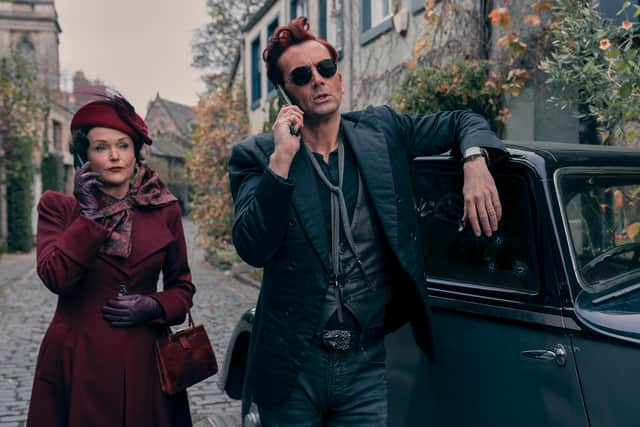TV reviews: Good Omens (Prime), Laura Whitmore Investigates (ITVX), The British Miracle Meat (C4), The Power of Parker (BBC1), Dreaming Whilst Black (BBC1), Missing: The Lucie Blackman Case (Netflix)
David Landlord? Nah. David Premier? Much bigger than that, David Omnipotent maybe, although in Good Omens (Prime Video) he’s kind of David Cameron, one half of a coalition, which means Michael Sheen is Nick Clegg, although I don’t think either of them would accept the comparison.
They’re certainly strange bedfellows, with Sheen’s angel and Tennant’s demon putting fundamental differences aside to work together on Earth to stop Armageddon. This is the second series of the big-budget fantasy drawn from the fevered imaginations of Terry Pratchett and Neil Gaiman, although sometimes small is best, like when Tennant’s Crowley parks up his Bentley in Circus Lane, Edinburgh’s prettiest mews.
Advertisement
Hide AdIt’s a crazy show with crazy casting. Doon Mackichan didn’t bolt from Two Doors Down to Sharm El-Sheikh; she went to heaven and now has her eyes on the job of supreme archangel, replacing Gabriel, who’s played by … Mad Men’s Jon Hamm.


Gabriel, having lost his memory and his clothes, turns up in London at the bookstore run by Sheen’s Aziraphale. The two stars have a blast with their campy competitive bromance, Sheen sporting blond spikes as if he’s stuck his hand in a toaster and Tennant a crimson ripcurl of a quiff and eyes which turn into prize-winning bools when he’s angry.
But if there’s to be an apocalypse and London goes up in smoke, I sincerely hope that lovely record shop is left standing.
My favourite character in W1A, the Beeb-satirising mockumentary, was programme commissioner David Wilkes played by Rufus Jones. His ideas were invariably ridiculous, often involving Kyle Minogue or some-such blonde bombshell in an improbable and compromising setting. It seemed he thought Alan Partridge’s desperate pitches – Youth Hostelling with Chris Eubank, Monkey Tennis – were serious and had definite potential.
Tuning in halfway through the first of Laura Whitmore Investigates (ITVX), you might assume it’s Wilkes up to his old tricks, with the former Love Island presenter and Celebrity Juice Aunt Sally reinventing herself as an investigative journalist to demonstrate … a spanking bench?


Yes, really. Whitmore has a journalistic background so maybe this series is actually what she wants to be doing. Well, it’s sex-themed, beginning with BDSM. You know what that is, right? Google it if you don’t. Whitmore meets a “kink educator”. She’s invited to try assorted whips and paddles on herself – to become, as she’s told, the “spankee”. “In for a penny,” she giggles.
Advertisement
Hide AdShe comes out with the phrase again on the set of a porn shoot. “This isn’t my average Monday,” she says. “Yesterday I was at soft play.” She’s nervous, as I’m sure top journos like Jeremy Bowen and Fergal Keane would be in the company of the performer calling herself Melody Pleasure. But there is a serious side to the report – an increasingly aggressive sexual culture, the youth being porn-led, an upsurge in crimes of violence against women and the so-called Fifty Shades of Grey defence when cases reach court.
Whitmore handles all of this attentively, sensitively and well, including an interview with the grieving father of a 20-year-old Aberdeen girl who walked out of the trial of the man accused of strangling her feeling like his daughter had been implicated in her own murder. A pity, then, that this seems like two separate programmes, with the first required to trade on Whitmore’s sexy image.
Advertisement
Hide AdBut that’s TV, I suppose. It’s a crowded scene. You must use what you’ve got when the competition includes that magnificent hunk Gregg Wallace, a living god in a factory hairnet atop a baldy heid. He could sell us anything, serve us anything – even human flesh.


Well, The British Miracle Meat (Channel 4), as you probably realise, is a fantasy. A near-fantasy, Wallace would claim, or rather a near-nightmare. The cost of living-battered donate body tissue, which is grown in a lab and comes out as steak. Thigh earns you £200, double buttock £400. We are what we eat! We eat what we are!
Wallace keeps his satire going right through the taste-testing by Michel Roux Jr, the top chef spotting when the meat comes from a stressed environment (NHS workers, bless ’em, are “stringy”). But I rumble our man when the “premium cut” is revealed. I was sure this was going to be Wallace himself, the sample carved while he dozed after a heavy lunch.
The show is typical C4 and very shocky, though is actually inspired by a 1729 essay by Jonathan Swift, who proposed the poor sell their children to the rich as food. Were codpieces still worn in Swift’s day? I don’t know, but perhaps Wallace’s hairnet is his modern take on one – superfluous, but drawing attention to his most significant feature.
If The Power of Parker (BBC1) makes you think of Peter Kay’s Car Share that’s because it’s got Sian Gibson. And Conleth Hill. And the same writers who’ve stuffed the new comedy with recognisable choons and the sort of 1990s references that would make Kay smile: Fiat Pandas, teasmaids, Tenko, Teletext, Silk Cut, cheese cubes and suited businessmen in cowboy boots.
This is Martin Parker (Hill), an electrical goods kingpin who’s not doing as well as his flash attire, Mercedes and mistress suggest. When loan sharks get heavy, he dumps the mistress. Bad move. She knows Parker’s wife only too well and seems unlikely to go quietly.
Advertisement
Hide AdThe Power of Parker is a cheese cube of a sitcom – few surprises, but dependable – though Dreaming Whilst Black (BBC1) is better. It’s funny about office life in just a few scenes, so you’re disappointed that Kwabena (Adjani Salmon) jacks in recruitment so quickly. It’s funny about inclusivity, but ever so subtly – ditto in the way it’s funny about race. Our hero doesn’t take offence when a white person says or does the wrong thing; he simply smiles.
Kwabena’s dreaming centres on his ambition to become a film-maker. He seems imaginative enough and fantasy sequences abound. The funniest of them in the opener is when he imagines himself delivering killer-chat-up lines to a girl on the bus. The karaoke night which proves beyond all reasonable doubt that white men can’t rap is all too real.
Advertisement
Hide AdMissing: The Lucie Blackman Case is Netflix’s retelling of a terrible tale that shocked a generation of parents of girls intent on travelling to the far side of the world for adventure.
In 2000, the 21-year-old disappeared in Tokyo where she worked as a nightclub hostess and seven months later her dismembered body was found in a cave. I don’t watch many true-crime reconstructions, but reckon this one must be more sensitive and less sensational than some.
Lucie’s father Tim is prominent in the film. Too prominent in the investigation, you sense, for the Tokyo police who prefer to go about their work quietly and, it seems, slowly. Eventually a detective who his superiors dub a “suppon” joins the hunt and the cops get their man, a serial rapist who may have chloroformed and raped 400 women. Suppon? It’s a turtle that bites and never lets go.
Comments
Want to join the conversation? Please or to comment on this article.